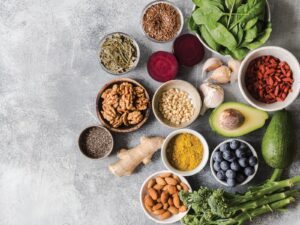I first thought about supplements when I became pregnant with my first child. My obstetrician prescribed prenatal vitamins which I dutifully took. My son was born very healthy and then I promptly stopped taking them. I took prenatal vitamins again a few years later when I was pregnant with my daughter. I did not think about supplements again until 2008 when my general practitioner checked my Vitamin D levels as part of the many tests she ran to discover the causes of my physical pains and exhaustion.
Over the years, through my nutrition education, I have learned a lot more about the role supplements can play in our health status. Scientists have identified four macronutrients (water, protein, carbohydrates, and fats) as well as vitamins and minerals that are essential to human health. Essential means that the body cannot make these nutrients. We need to get them from food.
Vitamins and minerals are called micronutrients because we only need them in small amounts. Vitamins A, C, D, E, K, and a number of B vitamins are all essential, as are the minerals calcium, chloride, iron, magnesium, phosphorus, potassium, sodium, and a few more trace minerals. If we do not consume each of these nutrients in sufficient amounts, negative symptoms and diseases can occur. Theoretically people should be able to obtain all of the nutrients needed from food. Unfortunately many people have nutrient depletions, as I found I did, and so should consider taking supplements.
Four Reasons to Consider Taking Supplements
1. Our foods have reduced nutrients.
A number of studies conducted since 1950 compare the amounts of vitamins and minerals in our fresh foods. One such study by University of Texas researchers was completed in 2004 using the USDA database. It found that there had been significant declines in protein, calcium, phosphorus, iron, riboflavin (vitamin B2), and vitamin C in its study of 43 different vegetables and fruits. Other studies have shown declines in most nutrients of between 12% and 37% over this time period. This change seems to be primarily because of the depletion of as much as 85% of the mineral content in soil. Some studies have shown that organic foods have more vitamins and minerals than conventional produce, but the level is still lower than 75 years ago. I encourage a whole foods diet full of fresh vegetables and fruits, but because of this lower nutrient level, a high quality multivitamin is probably advisable for most people.
2. Many prescription medications deplete nutrients.
Many people with heart issues take statins. These drugs deplete a number of nutrients including Omega-3 fats, vitamin K, and CoQ10. Many people also take some form of NSAID for pain and inflammation on a regular basis. These can deplete folate, iron, vitamin C, and melatonin. Acid blocking drugs such as Prilosec, Nexium, and Zantac can deplete multiple vitamins and minerals. One course of antibiotics wipes out not only the bacterial infection but also much of the helpful bacteria in your intestinal tract. Although your physician may alert you to potential depletions from your medications, it would be advisable to check online or with your pharmacist to learn about nutrients that may be depleted. You likely will want to supplement those nutrients as long as you are taking the medication.
3. You may need more of certain nutrients due to genetic factors.
Much research continues on the human genome. A number of genetic variations, often called snips, have been identified that relate to how well nutrients are used. I learned that I have one variation that causes me to have a higher need for vitamin D supplementation than average. I have another variation called MTFHR that increases my need for certain B vitamins. Many physicians and other natural health practitioners are able to test for these genetic variations to help you determine your need for individual supplements.
4. Certain health conditions require more nutrients.
Many autoimmune conditions may be quieted by increasing levels of vitamin D, omega 3 fats, and probiotic supplements. Zinc and vitamin C have both been well documented for reducing colds and other respiratory infections. Women with osteopenia or osteoporosis have been helped with calcium, magnesium, and vitamins D and K supplements. Nutritionist like myself can help you determine what supplements might be most useful for any health challenge that you have.
Recently I had a micronutrient test done by Zoom Heaton of TLC Medical Center. The test she used looks at the levels of 31 micronutrients within white blood cells. Since I eat a very healthy diet with lots of vegetables, and already take some supplements, I was quite interested in seeing my results. I tested as deficient in Vitamins B3 and E and also in the amino acid serine. I have started supplementing with these as a result.
If you are already eating a healthy whole foods diet but are not in excellent health, I highly recommend you see Zoom for a free 15-minute consultation to see whether micronutrient testing would be helpful for you. For help determining your best whole foods eating plan, please contact me for a free 20 minute nutrition consultation.
























